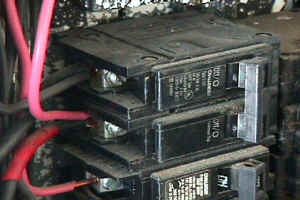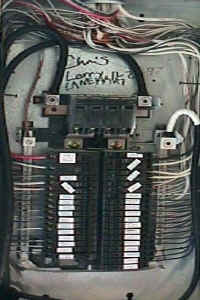Always make sure the power is off when working on the electrical system. If you are not familiar with the workings of your system, call an Electrician. Do not take your life into your own hands by working with electricity unless you know exactly what you are doing. One tenth of one amp is enough electricity to kill a person!
Circuit Breakers

Circuit breakers or fuses protect the electrical wiring and equipment in your home. These breakers and fuses could be compared to a safety valve that would limit the amount of power to a particular part of the home. Switching the breaker to off and then back on can reset circuit breakers. Fuses, which can be found in older homes, are a onetime use product. If they go bad, they must be replaced with another fuse of the same amperage. This is assuming of course that they had the proper rated fuse in the first place.
Aluminum Wiring
A common and legitimate concern is about aluminum wiring. Aluminum, like copper, is a good conductor of electricity. Most of the high voltage lines in this country are made of aluminum reinforced with steel. Aluminum wire is also commonly used for the wire that connects a house to the power transformer at the street. Aluminum was not used for the branch-circuit wiring that runs throughout the house until the 1960’s. In the early 1960’s a copper shortage drove up the price of copper. When this happened, electricians turned to aluminum wire. The problem is that they were using aluminum in conjunction with switches, wall outlets, and light fixture that were designed for copper wire. Unfortunately aluminum does not behave the same way copper does.
When aluminum is exposed to air, a film of aluminum oxide forms on the metal’s surface. This oxide is an insulator, not a conductor of electricity. If the wire is not firmly attached to an electrical receptacle in the first place, the aluminum oxide can build up rapidly. While aluminum, like other metals, expands when it gets warm and contracts when it cools, it expands and contracts more than copper. When electricity flows through an aluminum wire, the wire resists the flow of electricity and gets warm. If the wire is held in place with a screw made of a dissimilar metal, the screw forces the wire to expand, loosening the screw. When the current stops, the wire contracts. Although the movements are microscopic, the continual expansion and contraction can eventually work the wire loose. Vibrations and temperature changes around the wire can also lead to loose connections. When the wire is no longer making a sound connection, arching will occur. This is how fires are started.
There are specific devices and methods that are considered to be acceptable for use with aluminum wiring. If you a considering purchasing a home with aluminum wiring, have an Electrician inspect the integrity of each connection in the home.
Here are a few things to look for:
1. Cover plates on switches and outlets that are warm to touch.
2. Smoke coming from outlets or switches.
3. Sparks or arcing at switches and outlets.
4. Strange odor; such as the smell of burning plastic
5. Lights that flicker or burn periodically
6. Outlets, lights, or entire circuits that once worked fine but are no longer functioning. Do yourself a favor and check the ground fault circuit interrupters (GFCI) and bulbs before calling an electrician.